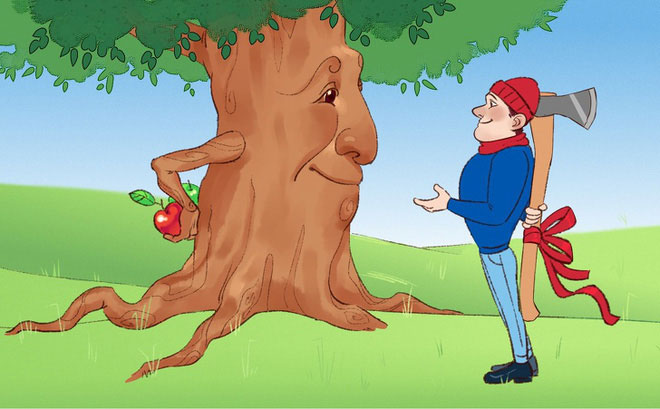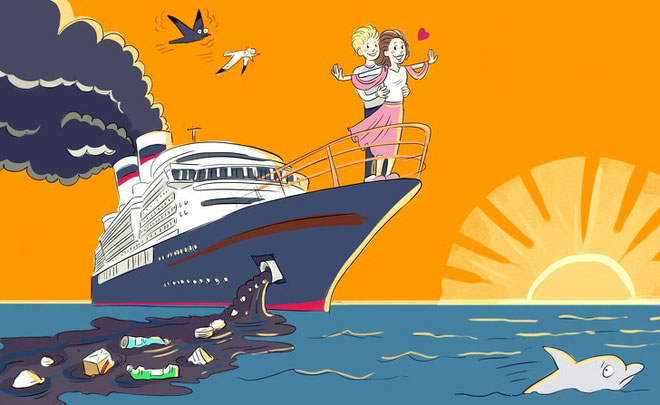6 habits that are thought to be harmless, but are actually causing the Earth to shed tears
The situation of climate change is becoming more and more tense on a global scale, with the latest evidence being the pictures of the dreamy city of Venice engulfed in seawater with historic floods. The same goes for pollution, hundreds of millions of creatures dying due to the ingestion of plastic waste.
And where is the cause? All are ultimately due to human action. Not only by the industry, but the harm comes from the countless habits we still think are harmless but makes the Earth cry.
1. Food waste - dishes that are never consumed

According to the Food and Agriculture Organization of the United Nations (UN), one third of the human food produced each year - equivalent to 1.3 billion tons - is being wasted.
"Waste" here means that the food has not been consumed by anyone and must be discarded. The problem is that food is not naturally born. Humans have to make them, and that production process has caused millions of trees to be cut, uprooted to make way for food fields.
Of these, fruits and vegetables are the most wasted food. Followed by seafood - because it is difficult to preserve.
2. Luxury travel - environmental killer

A summer vacation on a luxury yacht is probably the dream of many people. But yachts also have a dark side, which is they cause great pollution.
The data shows that the air quality on the deck is actually not as fresh as we thought it should be, equivalent to the world's most polluted cities. It is estimated that up to 50,000 Europeans die each year because of the emissions emitted by yachts.
On average, a person's carbon emissions will increase 3 times compared to normal. In addition, according to a survey in Germany on 77 yachts, there are 76 operated by heavy fossil fuels (also known as "dirty oil"), extremely toxic.
That's not counting the consequences of garbage, sewage and oil spilling out into the ocean.
3. Buying too many clothes: Wearing less, but much harm

Who does not want to have a closet full of clothes, one set for changing the trend every day. But many people are unaware that the fashion industry has always been one of the top polluters worldwide, even causing the second largest source of water pollution.
In addition, the process of finding clothing production materials is also responsible for water scarcity. For those who do not know, cotton (cotton) is an extremely water-consuming plant. To get enough cotton to produce one shirt, people need 2700 liters - enough for a person to consume for 2.5 years.
Artificial fabrics like polyester do not absorb water as much as cotton, but trade off by creating more greenhouse gases. 2015 figures show that polyester factories produce more than hundreds of tons of greenhouse gases, the equivalent of emissions from 185 coal power plants.
So the best way for this story is to refrain from buying clothes. Remember, 1/9 of the world's population is without access to clean water, and every year 4.6 million people die from air pollution.
4. Flush toilet water too arbitrarily

According to a 1999 study, toilet water accounted for 27% of a person's daily water use - higher than bathing (17%) and washing (22%). Over time, the toilet flush system has been improved to save water, but the number is still a lot.
This does not mean that you should stop going to the toilet, but need to flush the water to be more economical. Today's toilets are often divided into 2 buttons, allowing you to flush 1/2 tank of water for each "light" ride.
5. Use disposable chopsticks

Disposable chopsticks are convenient, are made of wood so are quite environmentally friendly.
But it is actually the opposite. In China alone, 80 billion disposable chopsticks are discharged each year, and to produce that number, 4 million trees are removed.
6. Use a wet tissue

Another item is extremely convenient, but not so environmentally friendly. Even in 2015, The Guardian newspaper called wet tissues as "the biggest enemy" to the environment.
Part of the reason lies in the way we use it. The word "tissue" makes many people think that they are similar to plain paper, meaning that they can be put into a toilet to flush. But in fact, most wet paper towels contain plastic, making them very difficult to decompose. And when they get out into the ocean, marine creatures may mistake wet paper for jellyfish, leading to disturbed food chains and serious damage.
Not to mention the potentially dangerous chemicals that exist in some types of wet paper.
- Secret tears: Each year produces 113 liters, richer water cries more
- Harmonic habits but harmless
- Find out the secret of tears
- If you think tears are only one type, you are wrong, there are 3 types of muscles
- Learn the terrible eating habits of butterflies
- The facts about hygiene habits make us fall back
- Miraculous structure inside human tears
- The truth about men's tears
- Strange effects of tears
- Why tears are salted?
- Girl flowing 'crystal tears'
- The cause of crying determines the composition of tears
 Is the magnetic North Pole shift dangerous to humanity?
Is the magnetic North Pole shift dangerous to humanity? Washington legalizes the recycling of human bodies into fertilizer
Washington legalizes the recycling of human bodies into fertilizer Lightning stone - the mysterious guest
Lightning stone - the mysterious guest Stunned by the mysterious sunset, strange appearance
Stunned by the mysterious sunset, strange appearance